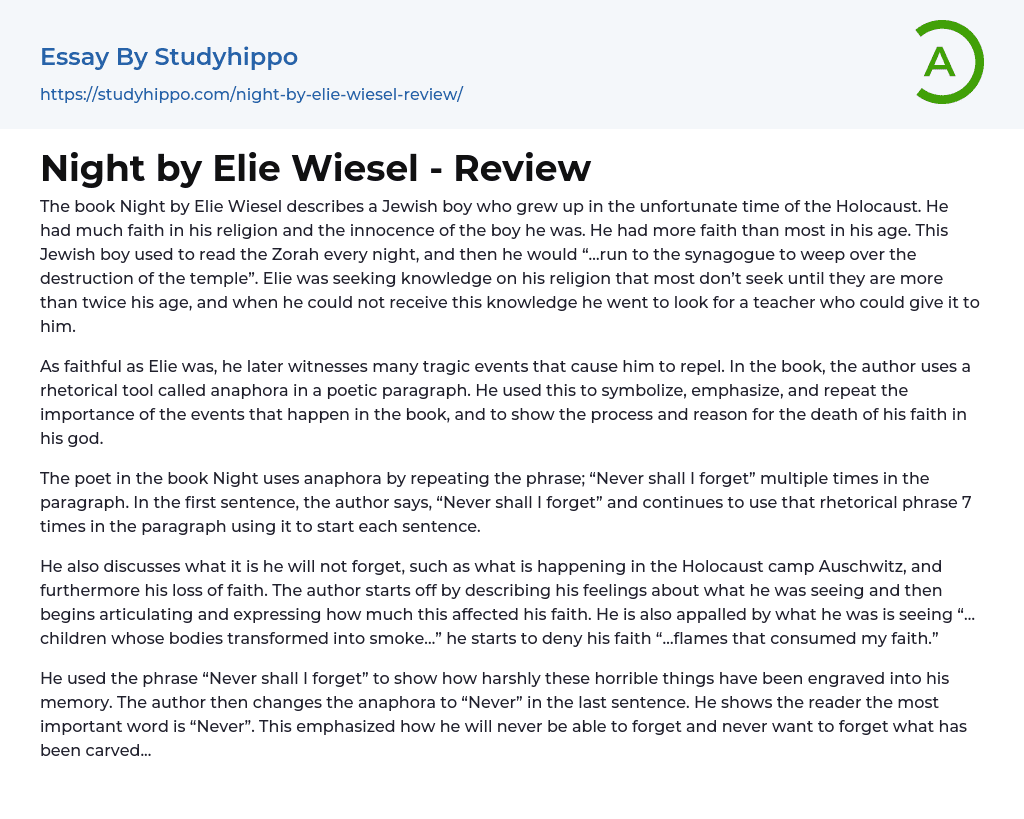The book Night by Elie Wiesel describes a Jewish boy who grew up in the unfortunate time of the Holocaust. He had much faith in his religion and the innocence of the boy he was. He had more faith than most in his age. This Jewish boy used to read the Zorah every night, and then he would “…run to the synagogue to weep over the destruction of the temple”. Elie was seeking knowledge on his religion that most don’t seek until they are more than twice his age, and when he could not receive this knowledge he went to look for a teacher who could give it to him.
As faithful as Elie was, he later witnesses many tragic events that cause him to repel. In the book, the author uses a rhetorical tool called anaphora in a poetic paragraph. He used this to
...symbolize, emphasize, and repeat the importance of the events that happen in the book, and to show the process and reason for the death of his faith in his god.
The poet in the book Night uses anaphora by repeating the phrase; “Never shall I forget” multiple times in the paragraph. In the first sentence, the author says, “Never shall I forget” and continues to use that rhetorical phrase 7 times in the paragraph using it to start each sentence.
He also discusses what it is he will not forget, such as what is happening in the Holocaust camp Auschwitz, and furthermore his loss of faith. The author starts off by describing his feelings about what he was seeing and then begins articulating and expressing how much this affected his faith. He is
also appalled by what he was is seeing “…children whose bodies transformed into smoke…” he starts to deny his faith “…flames that consumed my faith.”
He used the phrase “Never shall I forget” to show how harshly these horrible things have been engraved into his memory. The author then changes the anaphora to “Never” in the last sentence. He shows the reader the most important word is “Never”. This emphasized how he will never be able to forget and never want to forget what has been carved...
- Professor essays
- Should College be Free essays
- Should college athletes be paid essays
- College Education essays
- College Tuition essays
- Graduation essays
- College Goals essays
- Personal Statement essays
- Online Classes Vs Traditional Classes essays
- Online Education essays
- Student Loan essays
- Study Abroad Scholarship essays
- Reasons To Go To College essays
- Paying College Athletes essays
- Technology In The Classroom essays
- Classroom essays
- College essays
- E-Learning essays
- Elementary School essays
- Examination essays
- Graduate School essays
- High School essays
- History Of Education essays
- Homeschooling essays
- Kindergarten essays
- Middle School essays
- Public School essays
- School essays
- Single Sex Schools essays
- Special Education essays
- Student essays
- Teacher essays
- University essays
- Vocational Education essays
- Adolf Hitler essays
- Concentration Camps essays
- Elie Wiesel essays
- Holocaust essays
- Nazi Party essays
- Weimar Republic essays
- Afterlife essays
- Atheism essays
- Bible essays
- Buddhism essays
- Christian Worldview essays
- Christianity essays
- Confession essays
- Cosmological Argument essays
- Deism essays
- Devil essays




